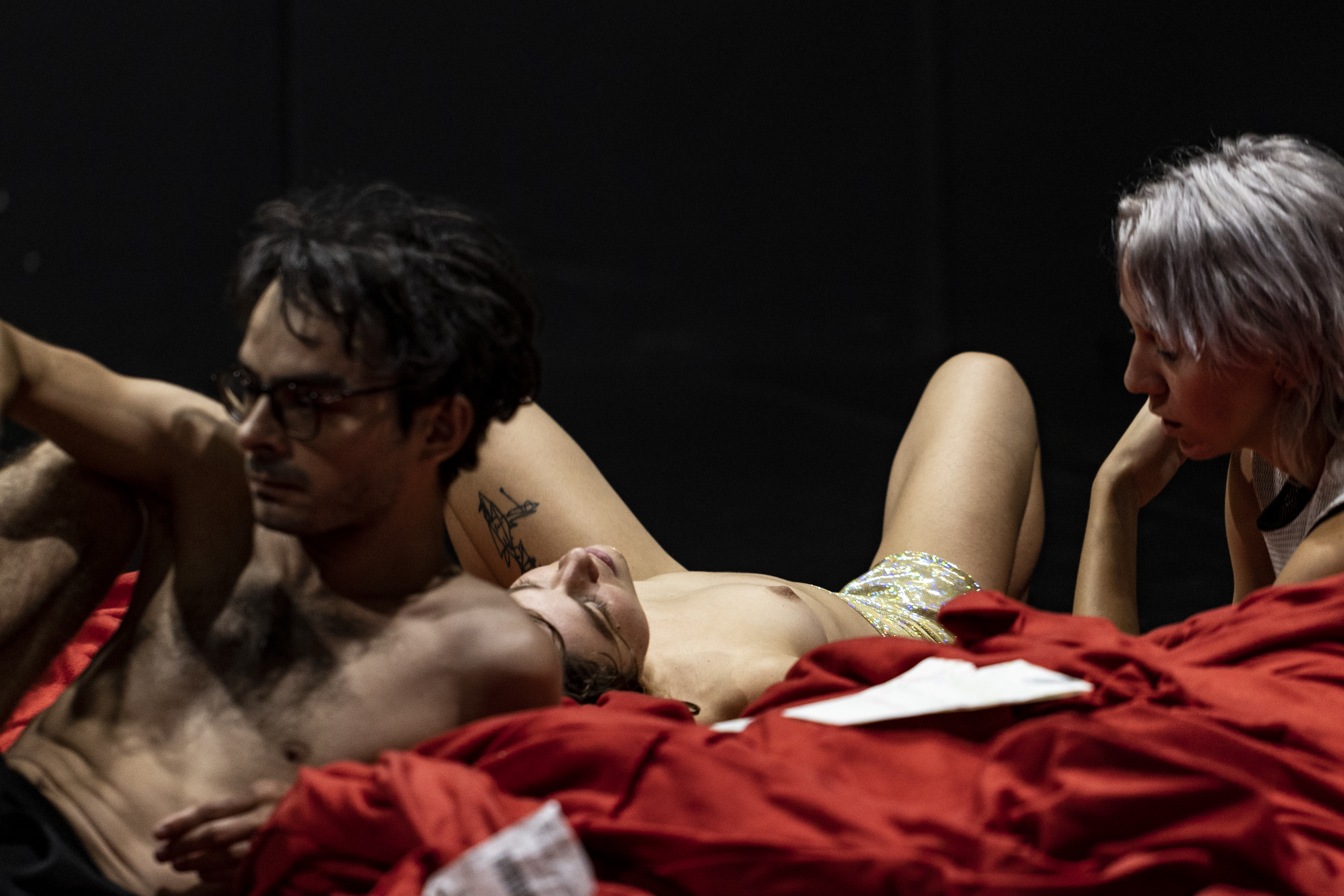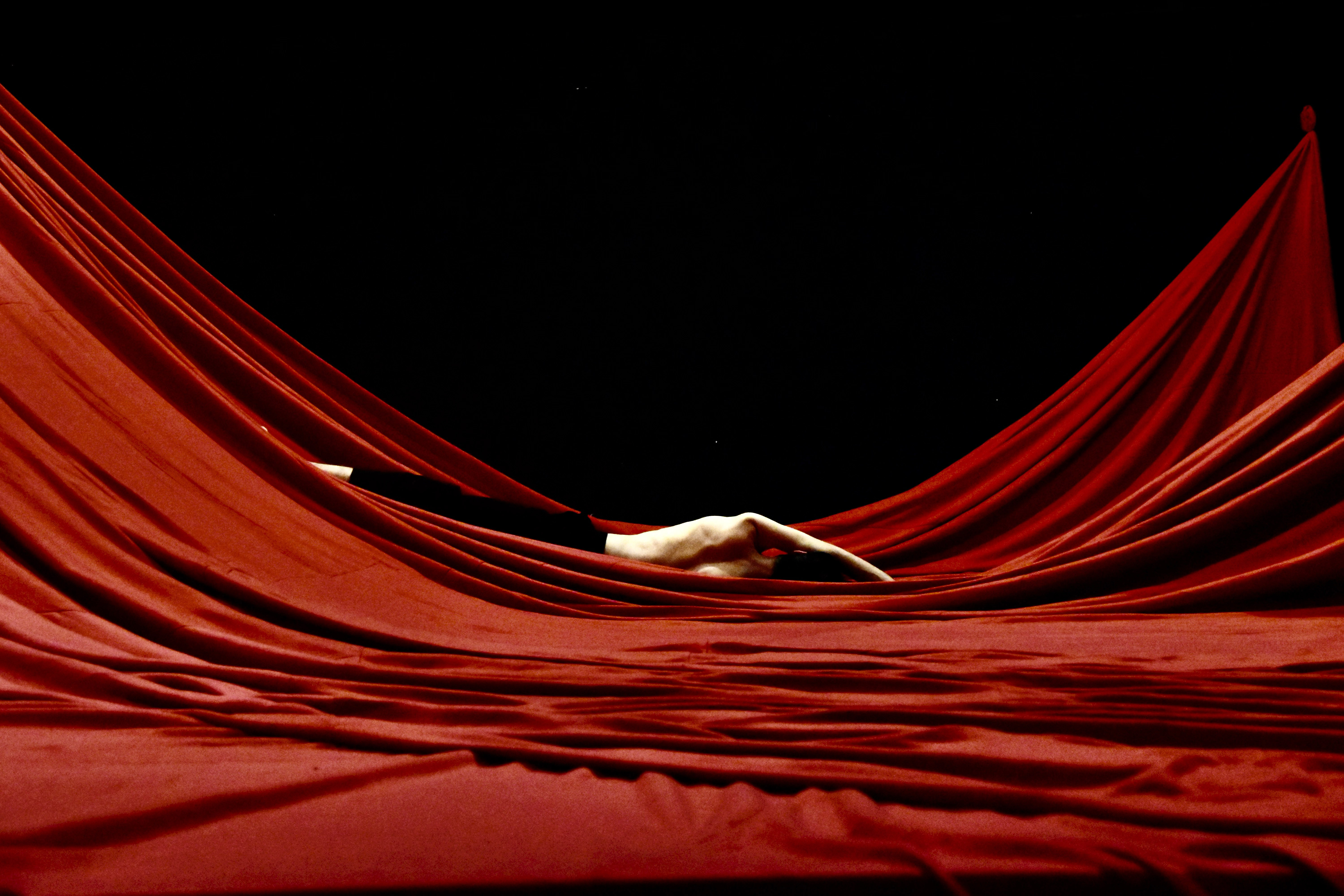STD - Spending Time Dancing
Spending Time Dancing presents Matej Kejžar’s artistic experimentation with Dancing discharged from the drive for choreography. In order to relieve dance from the burden, constructed in the concept of choreography, the burden of a carefully planned succession of movements as progress, the dancers indulge in the processes that defy the linearity of both movement and time.
The way time is spent can be, to some extent, vulgar and common, a series of time particles being placed one after another, or a directed productive process. What happens when Spending Time collides with Dancing? What relation are they in? Where Dancing approaches the non-linear, non-algorithmic, and non-constructive ways of spending time, it explicitly cuts into the contemporary idea of progress – by being seen as its opposite, Dancing speaks to the concept of “waste of time”.
Enters the common capitalist presumption that any activity that does not fulfill the conceptions of productivity as the main purpose of any life is not only irreversible but precisely wasted. However, waste is not always for no purpose. Think of the enormous potential of waste being made into compost which nourishes and fertilizes the soil. Whereas contemporary societies tend to only speak about “growing” the food, they disregard the processes of decay as crucial for life to flourish. In terms of Dancing, choreography as a process of constructing something in time hides its crucial counterpart, the wasting of time. In that sense, wasting time seizes to be time wasted and becomes a new, and critical, perspective on contemporary Western and patriarchal conceptions of progress as the ideal. We do not necessarily grow when we work, but when we Spend Time Dancing, we flourish.
The way time is spent can be, to some extent, vulgar and common, a series of time particles being placed one after another, or a directed productive process. What happens when Spending Time collides with Dancing? What relation are they in? Where Dancing approaches the non-linear, non-algorithmic, and non-constructive ways of spending time, it explicitly cuts into the contemporary idea of progress – by being seen as its opposite, Dancing speaks to the concept of “waste of time”.
Enters the common capitalist presumption that any activity that does not fulfill the conceptions of productivity as the main purpose of any life is not only irreversible but precisely wasted. However, waste is not always for no purpose. Think of the enormous potential of waste being made into compost which nourishes and fertilizes the soil. Whereas contemporary societies tend to only speak about “growing” the food, they disregard the processes of decay as crucial for life to flourish. In terms of Dancing, choreography as a process of constructing something in time hides its crucial counterpart, the wasting of time. In that sense, wasting time seizes to be time wasted and becomes a new, and critical, perspective on contemporary Western and patriarchal conceptions of progress as the ideal. We do not necessarily grow when we work, but when we Spend Time Dancing, we flourish.




“[...] a space where each of the dancers is allowed to do anything, without judgement - an environment where their bodies are truly the protagonists. […] The dancers were really dancing, spending their time on stage, not trying to satisfy systemic guidelines, audience expectations or any other distraction that would have moved them off their boldly set trajectory. [...] Even more important than the possible unprincipled solutions is the realisation that every time we allow ourselves to liberalise our thought structure we are truly living, truly growing and truly blossoming! So vivat, cresceat, floreat!”
Vivat, cresceat, floreat; Odrišča.si, Neža Vengust in Matic Ferlan,
“The logic of cause-and-effect relationships also seems to be breaking down. The long pauses, the shifts, the breaking down of the dance performance into elementary parts, such as movement, voice, words, sentences with or without music, all of this is slow, atomised, yet still connected into a common tissue of space, time and the physicality of bodies…bodies come together in a joint choreography and we enjoy watching them enjoy themselves on stage.”
Resistance of time wasted freely, Sigledal, Ana Lorger
Author: Matej Kejžar
Dancers: Dora Brkarić, Viktoria Bubalo, Daniel Petković
Scenography and lights: Petra Veber
Production: Pekinpah
Duration: 90’
Premiere: 14 September 2022
2022
![]()
![]()
Dancers: Dora Brkarić, Viktoria Bubalo, Daniel Petković
Scenography and lights: Petra Veber
Production: Pekinpah
Duration: 90’
Premiere: 14 September 2022
2022


Viktorija Bubalo (1997) is a professional dancer and a choreographer who currently lives and works in Zagreb. After graduating from School of Contemporary Dance Ana Maletić, she enrolled in the Academy of Dramatic Art in Zagreb, where she finished the Performance Strand at the Contemporary Dance Department in 2020. She is the winner of the Award of the Croatian Professional Associations of Contemporary Dance for the most promising dance artist for the season 2019. /2020. She is working on the continuation of her two previously mentioned choreographic works, in which she involves exploring the voice and the use of written text in dance.
Dora Brkarić (1996, Pula, Croatia) graduated from Academy of Dramatic Arts in Zagreb, then continued development at UNIARTS Helsinki (Contemporary Dance), Blank Experimental movie school in Zagreb and SNDO Amsterdam (Choreography).Her solos and movies performed on festivals: Monoplay, Ganz novi festival; Life is Grejp produced in gallery Garaza Kamba (Zagreb), Performative Installation in space (own project) travelled around in different galleries in Croatia.
Daniel Petković is a dancer, actor and performer. In the past years he performed at various
festivals and collaborated with different collectives, directors and choreographers. He is
interested in live art, neoburlesque, contemporary dance, drama, hybrid forms of performance
art, voice acting and moderating at events.